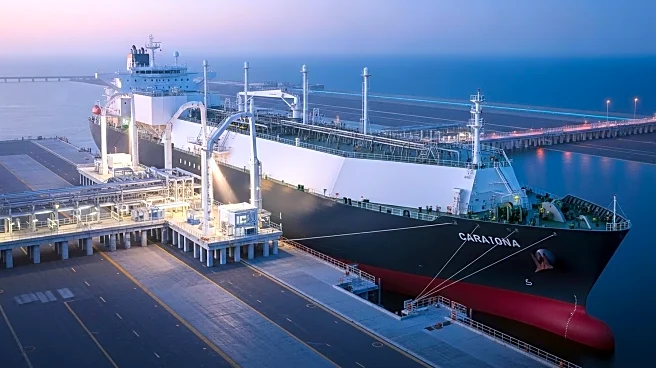What's Happening?
Stena Bulk, a tanker shipping company, has entered into a cooperation agreement with Seasystems AS to globally market and deliver its jettyless LNG infrastructure technologies. Seasystems will exclusively handle the marketing, sales, and delivery of Stena Bulk's proprietary Extended FSU/FSRU Mooring (EFM) system and Jettyless Floating Terminal (JFT) technology. These technologies, developed by Stena Bulk, allow for LNG storage and transfer without traditional jetties or fixed infrastructure, requiring only a suitable near-shore or offshore location with sufficient water depth. This partnership aims to provide flexible, safe, and cost-efficient LNG import and export solutions, even in challenging environments.
Why It's Important?
The partnership between Stena Bulk and Seasystems is significant for the LNG industry as it introduces innovative solutions that reduce dependency on costly infrastructure. This could lead to increased accessibility and efficiency in LNG operations, potentially lowering costs for companies and consumers. The jettyless technology offers a strategic advantage in regions where traditional infrastructure is impractical or economically unfeasible, thus expanding the market reach for LNG. This development may also encourage further technological advancements and investments in the LNG sector, impacting global energy markets.
What's Next?
The collaboration is expected to enhance the deployment of Stena Bulk's jettyless technologies worldwide, potentially attracting interest from regions looking to improve their LNG capabilities without heavy infrastructure investments. Stakeholders in the energy sector may monitor the success of this partnership to assess its viability and scalability. Future developments could include additional partnerships or expansions into new markets, driven by the demand for more flexible LNG solutions.
Beyond the Headlines
The introduction of jettyless technology could have broader implications for environmental sustainability in the energy sector. By minimizing the need for extensive infrastructure, these technologies may reduce the environmental footprint associated with LNG operations. Additionally, this approach could foster greater energy independence for regions with limited access to traditional LNG facilities, promoting economic growth and energy security.









